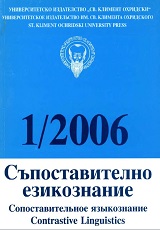Typological analysis of the imperative paradigms in the Slavic languages
Typological analysis of the imperative paradigms in the Slavic languages
Author(s): Krasimira Angelova ChakarovaSubject(s): Language studies, Language and Literature Studies, Western Slavic Languages, Eastern Slavic Languages, South Slavic Languages
Published by: Софийски университет »Св. Климент Охридски«
Keywords: Slavic languages; imperative paradigms;
Summary/Abstract: The topic that the present article studies is the verbal category ‘imperative mood’, characteristic of all contemporary Slavic languages. The paper attempts to make a typological classification of Slavic imperative paradigms with regard to various distinctive criteria, defined in the course of the analysis. It investigates the level of unification and structural analogy; but at the same time it raises the question of formal-semantic asymmetry when the imperative forms find their grammatical realization in the nucleus of the modality. There has been an emphasis on the unique place which the Bulgarian language takes among other kindred languages in respect of the great diversity of analytical forms - a result of the specific intralinguistic changes. The concluding part of the study presents some of the recent tendencies in the functioning of Slavic imperatives.
Journal: Съпоставително езикознание / Сопоставительное языкознание
- Issue Year: 2006
- Issue No: 1
- Page Range: 41-54
- Page Count: 14
- Language: English
- Content File-PDF

